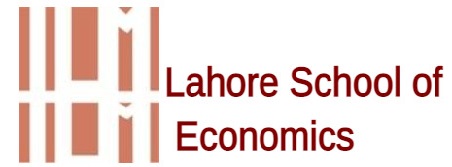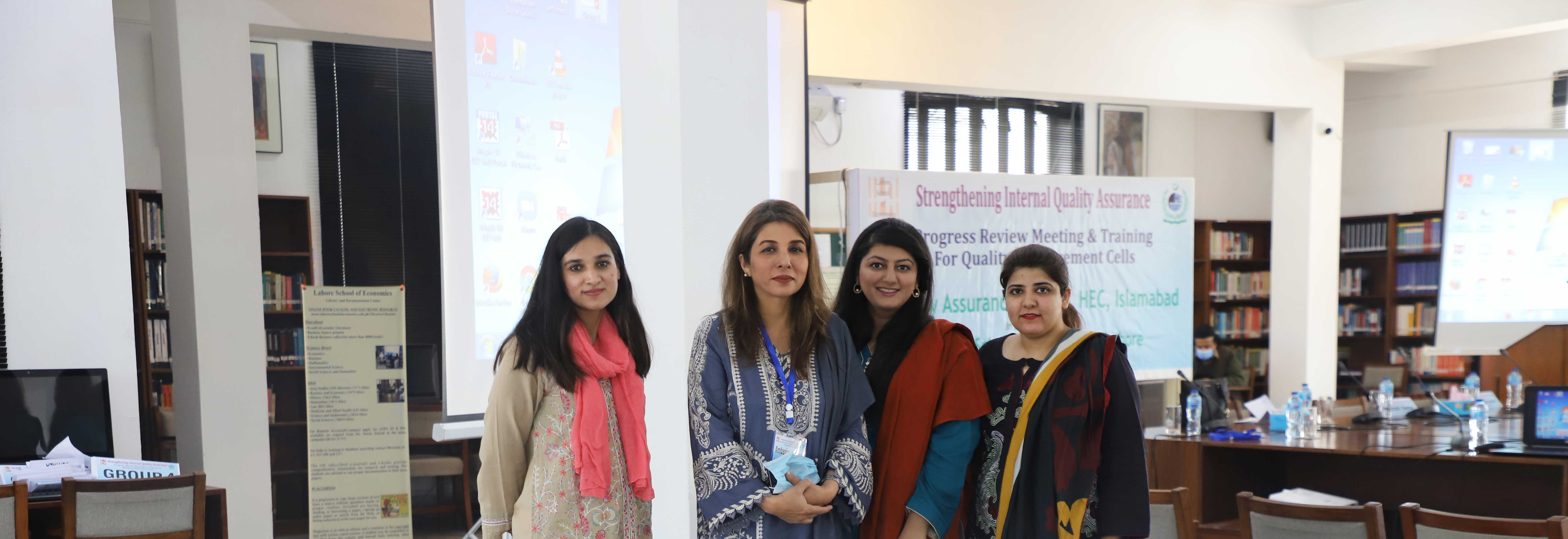Quality Enhancement Cell
Quality Enhancement Cell at the Lahore School of Economics (2024-25)
The Quality Enhancement Cell at the Lahore School of Economics was established on November 06, 2012 with the aim of ensuring high standards of education and improving the quality of teaching at the Lahore School of Economics. Its mission and vision is as follows;
MISSION STATEMENT OF QEC
To ensure, maintain and promote quality of education at national and international levels through a systematic process of sustaining academic excellence.
VISION OF QEC
To develop and maintain high education standards through a sustained Quality Enhancement mechanism.
Constitution of the Quality Enhancement Cell at the Lahore School of Economics
The Lahore School of Economics has reconstituted its Quantity Enhancement Cell as the office of Institutional Quality Assessment and Effectiveness (IQAE) which will comprise the following:
- Dr. Azam Chaudhry, Professor, Dean and Head of Economics Department, Pro-Rector, Director ITC and Head IQAE
- Ms. Amberin Tanveer, Director IQAE
- Ms. Khadeeja Idrees, Senior Assistant Director IQAE Coordinator for Business Department
- Ms. Sundus Farooq, Senior Assistant Director IQAE Coordinator for Economics Department and The Graduate Institute of Development Studies (GIDS)
- Ms. Bisma Nawaz, Assistant Director IQAE Coordinator for Social Sciences and Media, Art and Design Department
- Ms. Maryium Nazif, Assistant Director IQAE Coordinator for Mathematics and Statistical Sciences Department
- Ms. Tayyba Ishaq, Assistant Director IQAE Coordinator for Environmental Science and Policy Department
Membership of International Bodies
The Lahore School of Economics renewed memberships of the following International Bodies during the year 2020-25;
-
Asia Pacific Quality Network (APQN) – The APQN is a non – governmental and non – profit network with 208 members from 40 countries and territories aiming to enhance the quality of higher education in the Asia – Pacific region. The network focuses on quality assurance in higher education, cross border education, international collaboration and capacity building.
-
International Network for Quality Assurance Agencies in Higher Education (INQAAHE) – INQAAHE is an international Quality Assurance body that works closely with National Accreditation bodies and academicians to facilitate educational quality in round 140 countries. The main purpose of the network is to collect and disseminate information on the current and developing theory and practice in the assessment, improvement and maintenance of quality in higher education. It promotes good practices in the maintenance and improvement of quality, facilitates research into the practice of quality management in higher education and its effectiveness. It permits better – informed international recognition of qualifications and assists members in determining the standards of institutions operating across national borders.
-
Association of Quality Assurance Agencies of the Islamic World (QA – Islamic) – QA-Islamic was established in 2011 with the goals of enhancing the capacity of quality assurance agencies in countries of the Islamic World. It also aims to facilitate collaboration and exchanges of best practices, experiences and expertise among quality assurance agencies of countries of the Islamic World and encourages co-operation with regional and international quality assurance organizations.
-
Pakistan Network of Quality Assurance in Higher Education (PNQAHE) – PNQAHE was launched in the 1st International Conference on Quality Assurance in Higher Education, December 18-19, 2017 organized by Khyber Medical University at Peshawar. The purpose of the network is to provide a platform to QECs of Pakistani HEIs to share best practices and address issues.
Conferences Attended / Participated
-
Director QEC presented a paper in the “International Conference of PNQAHE & Annual General Meeting, "Stakeholders Engagement in Quality Assurance -Shaping Higher Education with inputs from all Relevant Voices”. The topic of the paper presentation was “Role of Students in Quality Assurance at the Lahore School of Economics”. The conference, held from April 14-16, 2025, in Lahore. The presentation highlighted the integral role of students in Quality Assurance (QA) at the Lahore School of Economics, one of the premier business schools of Pakistan. It highlights the active involvement of students as partners and their effectiveness in enhancing educational quality through various mechanisms such as course evaluations, collaboration with Quality Assurance Advisory Board (QAAB) and participation in Review of Institutional Performance and Quality Enhancement process (RIPE). Drawing on global practices and frameworks, this paper emphasizes on the importance of student engagement in decision-making and feedback processes to enhance teaching methods, institutional policies and curriculum design. The incorporation of alumni insights further underscores the relevance of quality assurance practices in aligning academic programs with the emerging market demands. This paper also argues that promoting a culture of accountability and collaboration between faculty, students and administration is vital for sustaining academic excellence and institutional performance and effectiveness at the Lahore School of Economics.
-
A Progress Review Meeting of HEI’s was held at the Lahore School of Economics premises. It was organized by the Higher Education Commission of Pakistan in collaboration with the Lahore School of Economics. The topic of the workshop was “strategic Support in the Execution Phase of PSG-2023 and HEC-QAD Policies Awareness program”. QEC representatives of 77 HEI’s participated along with HEC officials. The review meeting consisted of interactive workshops and presentations.
QEC Activities / Tasks
-
Instructors have been instructed to upload all lectures, course outlines/course packs, quizzes/assignments and lecture slides on the Lahore School Student Portal for easy access to students and all relevant bodies.
-
The QEC staff has been preparing a tabular grid recording uploads of faculty course material/lectures on a weekly basis for circulation to the Deans/Director’s Committee and Faculty members. Also, a manual record is being maintained by the QEC office of instructor’s course outlines and exam papers for every semester.
-
Regular Peer Evaluation of Faculty members is being carried out. The report of the Peer Evaluator (a senior faculty member or Head of Department) is emailed to the instructor, Rector, HOD’s, HR department and also discussed with the faculty member.
-
The QEC department at the Lahore School of Economics is focused on collecting Course Learning Objectives (CLOs) from various courses and analyzing the data to determine the extent to which instructors have achieved these objectives. This initiative helps ensure that the courses meet their intended educational outcomes and maintain high standards of teaching quality. By tracking the achievement of CLOs, the department can identify areas for improvement, provide targeted support to instructors, and enhance the overall learning experience for students.
MS / MPhil/ PhD Review
The Lahore School of Economics conducted an MS/MPhil/PhD Review on April 29th, 2025.The review panel comprised of the following members:
-
Dr Azam Chaudhry, Pro-Rector, Dean Faculty of Economics and Head QEC
-
Dr Sohail Zafar, Dean, Faculty of Business Administration
-
Dr Nawaz Chaudhry Professor, Head of Department Environmental Science Department.
-
Mr. Fareed A. Fareedy, Professor, Faculty of Business Administration.
-
Duryab Fatima, Lecturer, Department of Economics, Lahore College for Women University
The review teams had meetings with all major stakeholders, students and faculty. The above stakeholders gave valuable feedback which will be part of the report to be shared with the Rector and follow up on these recommendations will be carried out in the upcoming year.
Program Review for Effectiveness and Enhancement (PREE)
Program Review for Effectiveness and Enhancement Reports were prepared for all non-accredited programs on the parameters specified by the Higher Education Commission of Pakistan. The process entails formation of a Program Team which prepares the PREE. An Assessment Team evaluates the reports giving recommendations for improvement. The Head of Department then prepares an implementation plan based on the recommendations which are followed up in the upcoming year.
Review Team for Review of Institutional Performance and Enhancement (RIPE)
The Lahore School of Economics has revamped its Quality Assurance framework under the initiative titled Review of Institutional Performance and Enhancement (RIPE). The RIPE framework is structured around sixteen standards that collectively ensure academic excellence, institutional effectiveness, and continuous improvement.
The Lahore School of Economics conducted a Self- Review Team for Review of Institutional Performance and Enhancement (RIPE) on the June 24th -26th, 2025. The review panel comprised of the following members
-
Dr. Azam Chaudhry, Pro-Rector, Dean Faculty of Economics and Head QEC
-
Dr .Sohail Zafar, Dean, Faculty of Business Administration
-
Mr. Fareed A. Fareedy, Professor, Faculty of Business Administration.
-
Duryab Fatima, Lecturer, Department of Economics, Lahore College for Women University.
The review teams had meetings with all major stakeholders, students and faculty. The above stakeholders gave valuable feedback which will be part of the report to be shared with the Rector and follow up on these recommendations will be carried out in the upcoming year.
Institutional Quality Circle (IQC)
The Lahore School of Economics has also established an Institutional Quality Circle (IQC) to oversee all quality assurance-related activities.
Profiles
Head QEC
Dr. Azam Chaudhry
Email azam@lahoreschool.edu.pk
Qualification Ph.D. in Economics
Experience Pro Rector: Lahore School of Economics Director ITC
Director QEC
Ms. Amberin Tanveer
Email amberin@lahoreschool.edu.pk
Qualification MBA in Marketing
Experience 24 years experience as a Director, QEC
Senior Assistant Director QEC
Ms. Sehrish Khan
Email sehrishk@lahoreschool.edu.pk
Qualification MBA in Marketing
Experience 10 years experience as Assistant Director, QEC
Senior Assistant Director QEC
Ms. Khadeeja Idrees
Email Khadeeja@lahoreschool.edu.pk
Qualification MBA in Marketing
Experience 06 years experience as Assistant Director, QEC
Senior Assistant Director QEC
Ms. Sundus Farooq
Email sundus@lahoreschool.edu.pk
Qualification MBA in Marketing
Experience 06 years experience as Assistant Director, QEC
Assistant Director QEC
Ms. Syeda Anna Amjad
Email anna@lahoreschool.edu.pk
Qualification MBA in Marketing
Experience 03 years experience as Assistant Director, QEC
Assistant Director QEC
Ms. Zara Nadeem
Email zara.nadeem@lahoreschool.edu.pk
Qualification MBA in Marketing
Experience 01 years experience as Assistant Director, QEC

